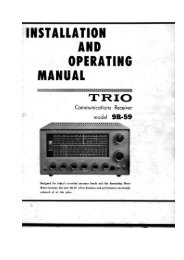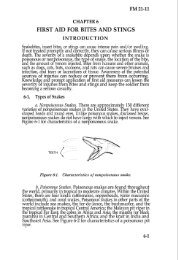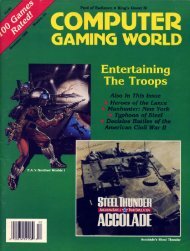Why Game? 1 - TextFiles.com
Why Game? 1 - TextFiles.com
Why Game? 1 - TextFiles.com
Create successful ePaper yourself
Turn your PDF publications into a flip-book with our unique Google optimized e-Paper software.
indulgent it is in this vice, perhaps more than<br />
any of the other games to date.<br />
Despite all this, it’s difficult for me to dislike<br />
it. In fact, I’m still rather fond of this one; and<br />
find it more playable and accessible than all but<br />
the very first in the series. What’s more, though<br />
I am bothered by the arbitrary fetch-questing,<br />
it doesn’t really interfere with my enjoyment of<br />
the game.<br />
I suppose the question that needs to be<br />
asked here is: is all of this really a vice in this<br />
case? Let’s suppose, for a moment, that the<br />
answer is “no”, which I think it is.<br />
What is the difference? <strong>Why</strong>, when Ocarina<br />
of Time tells me for the 100th time that a small<br />
key can be used to open a locked door, (but<br />
only in this dungeon!), do I feel like wringing<br />
Miyamoto’s neck and screaming “I KNOW<br />
ALREADY!”, but when Link's Awakening does it,<br />
it just seems like one of the game’s quirks?<br />
Looking at things on a psychological<br />
level, things maybe start to make a little more<br />
sense. After all, what’s really at stake in Link's<br />
Awakening? The premise, if you don't know,<br />
is that Link has been stranded on a desert<br />
island. Princess Zelda is presumed to be safe<br />
and <strong>com</strong>fortable. Hyrule is not even given<br />
mention, and is presumably experiencing peace.<br />
The island too, though subject to the usual<br />
“monsters are increasing” phenomenon of most<br />
RPG’s, is a relatively happy place. Presumably<br />
Link has some kind of motivation to leave and<br />
return home, but on the other hand, can the<br />
player really share this motivation? Given that<br />
it’s implied that Koholint Island is all there is to<br />
100 The <strong>Game</strong>r’s Quarter Issue #3<br />
the game, where else would the player want to<br />
go?<br />
So what then, is the player’s motivation?<br />
Eric-Jon Waugh, weekly columnist for Next<br />
Generation Online, once said, “the worst thing a<br />
videogame can do is assume that I have nothing<br />
better to do than play a videogame.” In many<br />
ways I think that sums up where the Zelda<br />
franchise has gone lately: they have be<strong>com</strong>e<br />
games for people who like playing videogames.<br />
Link's Awakening succeeds as it does, I think,<br />
because it kind of reverses this position.<br />
Bear with me here.<br />
I can’t speak for anyone but myself. But<br />
what really rubs me the wrong way with regards<br />
to modern Zelda games is not so much the<br />
way they take the player for granted but the<br />
pretense with which they do so. These are<br />
games that, using often beautiful, breathtaking<br />
visuals and storytelling, do their best to<br />
convince you that you have embarked on a<br />
quest of great, dramatic import; and then, as a<br />
means of <strong>com</strong>pleting that quest, they give you<br />
the most inane, insulting tasks possible. They<br />
take the player for granted. Even something like<br />
fighting a boss can often be broken down into a<br />
mechanical, easily reproducable set of actions<br />
once the boss’s weak spot has been discovered.<br />
(PROTIP: it usually involves using the treasure<br />
you found in that dungeon.) Wash, rinse,<br />
repeat.<br />
That’s kind of insulting, isn’t it?<br />
Link’s Awakening, on the other hand, is in<br />
a unique position. Coming on the heels of the<br />
resounding-yet-shocking-to-nobody success<br />
of A Link To The Past, it does its darndest to<br />
reverse-engineer as many elements of that<br />
game into its framework while at the same<br />
time, being released on a platform which, at the<br />
time, wasn’t the core of Nintendo’s business.<br />
The <strong>Game</strong>boy was more a side project. Nothing<br />
was riding on this game, and this allowed the<br />
developers to take some unorthodox liberties<br />
with the license. For example, Will Wright, as he<br />
appeared in the Sim City SNES games (as Dr.<br />
Write), is a character in Link’s Awakening. His

















